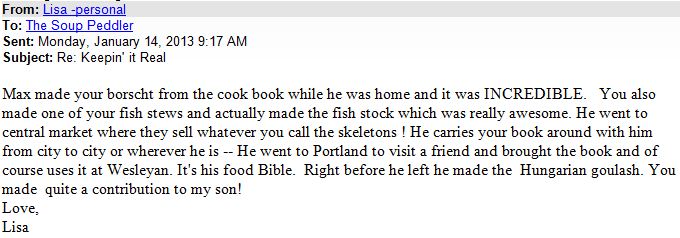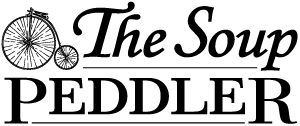At Times, I Forget I've Even Written A Book
I just received this incredibly touching message in the olde inbox.

I wrote The Soup Peddler's Slow And Difficult Soups in the summer of 2004, almost entirely in the dark, in a supine position, in my childhood bedroom with a laptop--as suggested by its name--on my lap. I had been interested in writers' rituals and workspaces ever since being exposed to Jill Krementz' photography (that's Eudora Welty on the cover). Tangentially, the single most star-struck moment of my life was when attending a bookstore lecture of hers, I ran into her husband lurking among the bookshelves at the store and introduced myself. Her photos show desks in various extremes of disarray, brimming ashtrays aside favored typewriters, those sorts of things. While there is no photographic evidence to document the writing of my book, I assure you that it was not nearly so visually rich a scene.
I began each day in as close to Vonnegut fashion as possible, with a cup of coffee and the Times crossword puzzle, then would retire to my room to write the book, which is part of a smallish sub-genre of a sub-genre of a corner of the bookstore called "fictionalized culinary memoir." One of the ways in which my writing approach is dissimilar to Vonnegut's is that, to the best of my knowledge, he never employed the use of a custom-made Microsoft Access database as a prose generator.
While that sounds rather un-romantic... in fact you might be tempted to go so far as to call it antithetical to any respectable theory on composition, I feel like it worked for me. The database (you can think of this as a series of spreadsheets) had tables called "characters," "settings," "themes," "dialogue," and "neuroses." You see, I had been collecting snippets of experiences over the previous few years of my business and I needed some way of categorizing them so I could craft a cohesive narrative from them. There were a few outlying bits that demanded that last category, "neuroses." I decided that the only way that I could write a book of memoirs at the ripe age of 30 without seeming pretentious was to stir in a few dashes of self-effacement, in the way of lovingly-amplified personal neuroses.
So after four weeks of writing everyday from 9 a.m. to 5 p.m. sharp, what ultimately came from the effort was something quite in the Keep Austin Weird category... quirky and whimsical and lowbrow/brilliant. According to my conservative estimates, each page is roughly 75-80% non-fiction. Not a frequent claim in the memoir field. There's actually a decent little narrative arc complete with hero (me) and arch-enemy (If you're reading this and have connections in the film industry, it would make a great feel-good film. Call me. Seriously.) Frankly, the last thing on my mind at the time was to write a cookbook. In fact, before the idea was respectfully (and correctly, probably) brushed aside by my publisher, I had wanted to include prose recipes. No numbers, no lists. However, when I first saw people flipping through the book, they would peruse from recipe to recipe and skip right over the lovingly-wrought prose. I would encourage them not to shelve it in the kitchen, but rather suggest, "It makes for very good bathroom reading!"
Well, here it is in 2013 and there's a lot of water under the bridge since then, and honestly my eyes haven't seen the inside of the book since 2005. However I know that it's still out there, and I seem to have pleasantly surprised my friend Addie by off-handedly mentioning that the book is in its second printing, probably somewhere around 13-14,000 in lifetime sales. Good thing I grabbed the last copy of the first edition to set on my bookshelf in the culinary classics section right next to Child, Claiborne, and Larousse.
